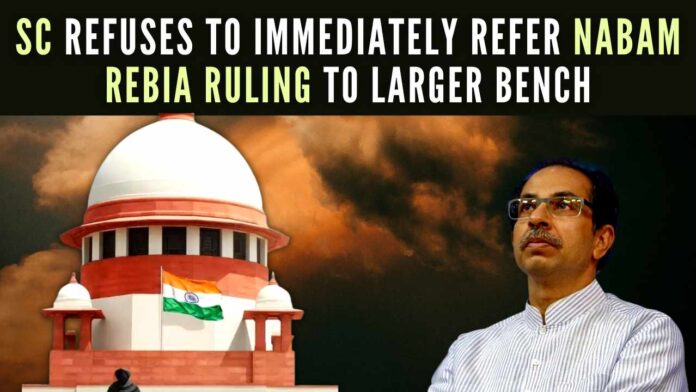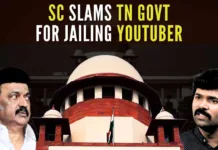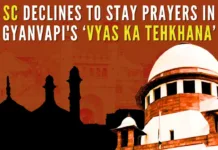
Setback for Uddhav camp as SC refuses to immediately refer the case to the larger bench
On Friday the Supreme Court declined to make an immediate reference to a seven-judge bench to reconsider its 2016 Nabam Rebia judgment, which restricted the power of the Speaker to examine disqualification petitions against MLAs if a resolution for his removal is pending.
A five-judge bench headed by the Chief Justice of India said the issue of reference will be decided only with the merits of the case, and fixed the matter for hearing on merits on February 21.
The bench observed that the question of reference to the 2016 Nabam Rebia judgment to a larger bench couldn’t be decided in an “abstract manner, isolated and divorced from facts of the case”. A detailed order will be uploaded later in the day.
The apex court pronounced its order on a plea made by Uddhav Thackeray‘s Shiv Sena faction to refer the five-judge bench decision in the Nabam Rebia case of 2016 to a seven-judge bench. During the hearing on Thursday, the bench — also comprising Justices M R Shah, Krishna Murari, Hima Kohli, and P S Narasimha — wondered if it could venture into the correctness of its previous judgment when the factual circumstances in the political crisis in Maharashtra do not arise.
The apex court observed that the Constitution lays down the principle with regard to overall disqualifications and on the Tenth schedule, the Constitution has introduced additional disqualification.
The Thackeray faction argued that Nabam Rebia judgment, which restricted the speaker’s power to examine disqualification petitions if a resolution of his own removal was pending, was prone to misuse for the benefit of defecting MLAs.
The bench noted that it had seen how vexed the Nabam Rebia can be. The judgment has laid down a principle and before the court decides to enter upon this to review it, “we have to be sure it strictly arises in this case.”
The bench further added that it is difficult to lay down a rule prescribing whether the speaker should decide within this time, discretion is given but whatever decision the speaker takes, it will relate back. Senior advocate Kapil Sibal, representing the Uddhav Thackeray faction, submitted that in the meantime, a legally elected government will be toppled. He further added, “take the present case… Eknath Shinde, he is the CM now. How is it going to relate back?”
The bench had noted that the correctness of Nabam Rebia judgment will arise if the speaker stood injuncted by this court from exercising power and the speaker created a problem for himself, maybe out of political necessity. It further added that the speaker only gave two days’ notice and the apex court extended the time for reply till July 12, 2022.
[With Inputs from IANS]
PGurus is now on Telegram. Click here to join our channel and stay updated with all the latest news and views
For all the latest updates, download PGurus App.
- Karnataka HM apologizes to Neha’s parents while the killer Fayaz’s mother expresses her desire to ‘punish her son’ - April 20, 2024
- US: Indian student’s death possibly linked to Blue Whale suicide game - April 20, 2024
- BSF seizes China-made drone near India-Pakistan border in Amritsar - April 20, 2024










